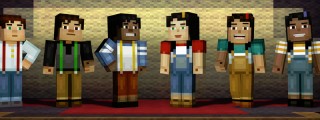Can television and video games live together in a harmonious medium? Mankind has searched for the answer to that question for years. You can probably count on one hand the number of video games featuring FMV that are good for anything other than a laugh these days, but for whatever reason there are those out there convinced that with the right implementation video games and full motion video can come together like peanut butter and jelly and create the ultimate entertainment experience. Can it be done? Does it even need to be done? Apparently someone over at Remedy thought so because now we have a new embodiment of mankind’s hubris in the form of Quantum Break, a title that doesn’t succeed in blending the two formats, but does come closer than anyone else ever has.

Capturing screenshots on the Xbox One proved to be a nightmare so you get promo shots for this one.
Quantum Break tells a very fractured narrative but its primary storyline revolves around Jack Joyce (played by Shawn Ashmore) who is invited to come test out a time machine created by his old buddy Paul Serene (Game of Thrones’ very own Aiden Gillen). Of course as is often the case with time machine demos things don’t go even remotely to plan and Jack finds himself with a handy new set of time related superpowers and the knowledge that the world will be ending in a few meager hours.
But despite playing through the majority of the game as Jack you’ll also spend some key moments watching or being in the shoes of others. Firstly the TV show component barely features Jack and Paul (presumably because they ran out of that movie star money), and instead chooses to focus on a rogue group of employees at Monarch, the evil corporate entity created by a time traveling Paul that will serve as your primary antagonist throughout the game. You’ll also pop into Paul’s shoes in between each of the game’s acts to make choices that will determine how the story progresses.

Hey look, it’s that guy from every TV show ever!
So basically your gameplay looks like this:
- Get through the playable action and exploration sections as Jack.
- Take control of Paul Serene, typically review the damage Jack just did and then make a decision on how Monarch will proceed.
- Watch a twenty minute episode of the TV show which will show you some scenes specifically tied to the choice Paul just made.
It sounds cool in theory, but it’s really weird in practice. You’re basically teleporting into the villain’s shoes between each mission and choosing how best to manage his evil empire. It’s hard to pick any choices except the less evil ones, or the ones that will typically harm Monarch the most. I mean why would you do what’s best for the company you’re fighting in all the other segments? I guess I shouldn’t complain about it anyway because in classic video game fashion none of the choices you make have any effect on the game’s ultimate outcome, they merely determine what extra scenes you get to see in the TV show and which dispensable characters die along the way.

Arguably Quantum Break does a better job blending books and games than TV and games. A huge (and I mean huge) part of the game’s story is told through text, typically in the form of essential emails left open on terminal screens. These logs are enormous dumps of story, much of which is essential to really having a solid grip on what’s going on in the game. There’s also a number of audio logs or radio excerpts to be found. These are less essential and it’s a good thing because they don’t show up in the game’s subtitles and they stop playing as you walk away from them.
But how about that action that makes up a third of the game? From Max Payne to Alan Wake, Remedy has always done an excellent job of making their third-person shooter combat stand out from the pack and Quantum Break is no exception. As a cover based shooter the game is somewhat bland, but like Max Payne Jack is at his best when he’s using his time control abilities to leap into the middle of combat with a hit and run approach. The game doles out plenty of powers that can all be upgraded although the currency necessary to do so is often very well hidden. The combat initially starts out way too easy but in the back half of the game I found the challenge to be just about perfect.

But Jack can’t spend all his time fighting and while the game’s combat segments are a great time they’re also tragically permeated with some downright sloppy platforming and puzzle sections. Jack can jump about four inches off the ground and has the incredible ability to snag himself on all manner of invisible corners. But the biggest issue is a lack of consistency, for whatever reason I would frequently find myself unable to mantle up walls and ledges that I had been climbing just moments earlier. To make matters worse the game is especially concerned that you don’t know what to do during the platforming segments and there will often be a character in the background shouting at you to hurry it up with obnoxious frequency.
So much has been said about the reduced resolution on the Xbox and the sloppy PC Port but I think it’s kind of been overlooked just how great Quantum break actually looks when you see it. There’s definitely noticeable stutter on the Xbox version along with some weird motion blur that borders on oppressive but ultimately it looks like it’s kind of a miracle they got this game to run on the Xbox hardware at all. All of the in-game models do a very impressive job resembling their real life counterparts with the exception of poor Dominic Monaghan who looks like he was designed based off a cruel caricature artist’s rendering.

I mentioned in a recent podcast that I suspected Quantum Break may have had to have been rushed out the door by Remedy, a developer who is somewhat notorious for taking their good sweet time making games. Although I will admit that I was wrong regarding the game’s runtime (I predicted 5-6 hours, the game actually lasts about 10) the game does still end with a lot of loose endings hanging. It’s not as bad as Alan Wake (which had pretty much no resolution), but there’s plenty of huge stuff left up in the air that I don’t think can be resolved simply through DLC.
Quantum Break isn’t the seamless blend of film and video games that you might have hoped for. Actually is anybody hoping for that? I’m not sure, either way it’s more of an experiment than it is a great game. If you’re a fan of Remedy’s work you may find it’s worth the sixty dollar asking price but personally I’d wait for it to go down a bit before taking the plunge.






